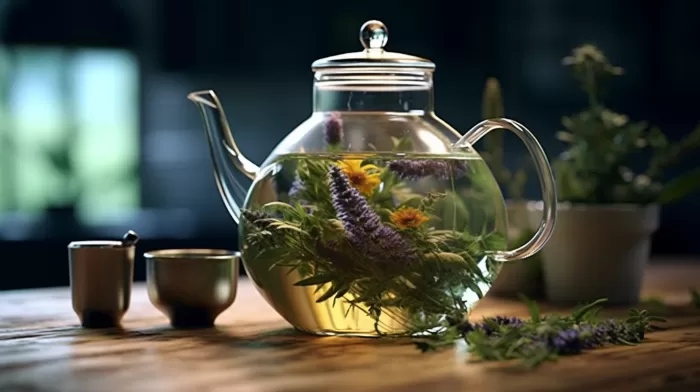Incorporating tea into your daily routine can do wonders for your health. Different types of teas from herbs and plants carry unique benefits that can help alleviate various ailments, boost mood and overall well-being, and even aid in weight loss. Here are some key teas for health and their primary uses:
Chamomile Tea: Calming and Mildly Sedative
Chamomile tea is well-known for its calming effects. If steeped long enough, it can even serve as a mild sedative. It’s great for both adults and children experiencing stomach cramps or insomnia. Additionally, chamomile tea has anti-inflammatory properties, making it beneficial for reducing arthritis pain and intestinal and menstrual cramps. Drinking it throughout the day can also help soothe a sore throat and alleviate cold or flu symptoms.
Valerian Root, Kava Kava, Passionflower and Lemon Balm Teas: Relaxing and Sleep-Inducing
If you’re struggling with mild insomnia or stress, valerian root, kava kava, passionflower, and lemon balm teas are perfect for promoting relaxation and sleep. Lemon balm can also help treat adrenal fatigue.
Lavender Tea: Soothes and Uplifts Mood
Lavender tea is excellent for soothing the mind and body, uplifting mood, and inducing sleep. It’s also effective at relaxing the smooth muscles of the gut, treating painful gas or bloating, and reducing fever.
Rosemary Tea: Muscle and Gall Bladder Relaxation
Rosemary tea helps relax muscles and the gall bladder, and can potentially relieve coughing and mild asthma symptoms.
Dandelion Leaf/Root Tea: A Natural Diuretic
Drinking two to three cups of dandelion leaf or root tea during a liquid cleanse helps flush out excess water through the kidneys, one of the main organs of elimination.
Milk Thistle Tea: Supports Liver Health
Milk thistle tea benefits the liver by helping it regenerate and protecting it from detoxified chemicals. This makes it particularly useful during a liquid cleanse. Additionally, it improves bile production, aiding in fat digestion.
Peppermint Tea: Calms Stomach Pain and Heartburn
Peppermint tea is commonly used to alleviate stomach pain and heartburn. However, be cautious if you have acid reflux, as it can relax the lower esophageal sphincter. This tea also calms stomach cramps, allows painful digestive gas to pass, and settles diarrhea, which is linked to increased peristalsis (contractions of the smooth muscle of the gut). These actions make it effective in treating irritable bowel syndrome as well.
Stinging Nettle Tea: Eases Pain and Reduces Symptoms
Stinging nettle tea can help with arthritis, fibromyalgia, and tendonitis pain. It also lessens asthma, hay fever, and allergic dermatitis symptoms, as well as reducing PMS symptoms in women. For nursing mothers, this tea can help promote breast milk production. Like dandelion leaf and root tea, stinging nettle tea also works as a natural diuretic and can help relieve acid reflux and nausea.
Damiana Tea: Aphrodisiac and Mildly Euphoric
Damiana tea is an aphrodisiac for both men and women, with mildly euphoric and stimulating properties. For a more potent effect, blend it with other teas known for their aphrodisiac qualities, such as ginkgo, horny goat, or yohimbe.
Yerba Mate: Weight Loss, Energy, and More
Yerba mate is a popular choice for promoting weight loss and increasing physical endurance and energy. It can also boost mental clarity and focus without causing the jitteriness or stomachaches commonly associated with other caffeinated drinks. Yerba Mate has been shown to lower cholesterol, protect the liver, and cause diuresis (increased urinary excretion). It has a high antioxidant capacity and has been reported to prevent cancer, though some data suggest a potential link between yerba mate and mouth and esophageal cancers in chronic users, possibly due to consuming it at high temperatures.
Ginger Root Tea: Immune System Boost and Nausea Relief
Ginger root tea is a strong immune system stimulant that can help fight off cold viruses and the flu. It is also effective in calming nausea and lowering blood pressure. Simply boil six to eight slices of fresh ginger root in 2 cups of water, let cool, and sip for over an hour.
Rosehips Tea: Vitamin C and Immune Support
Rosehips tea, made from the fruit of the rose plant, is one of the best plant sources of vitamin C. It can be added to cold and flu treatments and used to boost your immune function under almost any circumstances.
Ginkgo Biloba Tea: Improved Circulation
Ginkgo biloba tea is known for improving circulation, especially in the lower extremities. A 2000 report in the American Journal of Medicine showed that it significantly increased walking distance in subjects with intermittent claudication.
Echinacea Tea: Cold Prevention and Treatment
Echinacea tea can help prevent or treat colds, as it activates the immune system. It also helps relieve pain and reduce inflammation.
Hawthorne Tea: Helps Offset Hypertension
Hawthorne tea is made from the leaves, flowers, and berries of the plant and can aid in managing hypertension.
You can easily make teas a part of your daily routine, and flavor them with liquid stevia or raw honey for added sweetness without worrying about glycemic effects. Incorporating these teas into your day can help you feel good for life.



